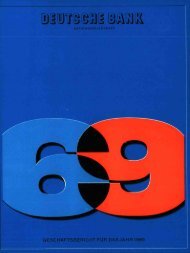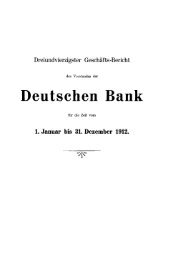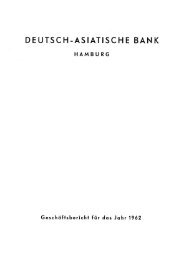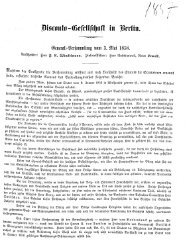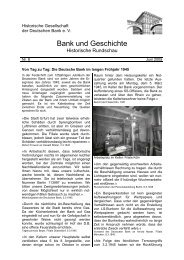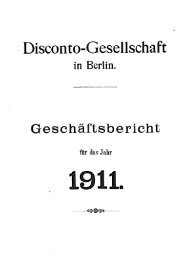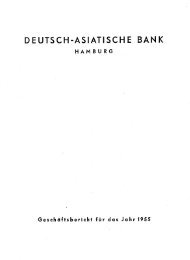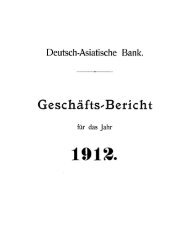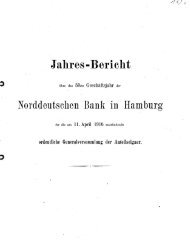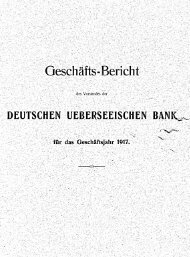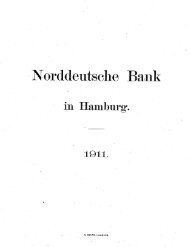Y - Historische Gesellschaft der Deutschen Bank e.V.
Y - Historische Gesellschaft der Deutschen Bank e.V.
Y - Historische Gesellschaft der Deutschen Bank e.V.
You also want an ePaper? Increase the reach of your titles
YUMPU automatically turns print PDFs into web optimized ePapers that Google loves.
Private notes in the year un<strong>der</strong> review remained an important tneans for financing the<br />
investinents of industry and public agencies.<br />
Closer economic ties with foreign countries in the year un<strong>der</strong> review benefited monetary<br />
stability in the Fe<strong>der</strong>al Republic. The foreign trade volumc reachcd a total of LJM x 24 billion.<br />
Thc surplus on foreign trade account amounted to DM 6. I billion. At this figure it was slightly<br />
above thc rcsults achieved in I 963. Total imports rose by just un<strong>der</strong> r 3 per cent, commercial<br />
imports expanded by almost 17 per cent, whereas exports were more than I I per Cent above<br />
the figure of the preceding year. Whilc thcrc was a forcign trade surplus, a deficit was registered<br />
in sexvice transactions (DM 0.8 j billion), restitutions (nhr z. I billion) as wcll as payments to<br />
intcrnational organizations, etc. Remittances effected by foreign workers to their home<br />
countrics rcpresented a charge of more than uhr I billion. Long-term capital transactions (pur-<br />
chases and/or sales of sccuritics, direct investment, etc.) on balance led to an outflow in the<br />
equivalent of »M 1.1 billion. At DM 30.3 billion gold and currency reserves of the Bundes-<br />
bank at the end of the year un<strong>der</strong> review were recorded at the Same level as the year<br />
before.<br />
At present there are no indicatioris that West Germany will record a foreign trade surplus<br />
in the futurc with a resulting increase in thc accrual of currency reserves. Many a supporter<br />
of changes in thc rates of exchange of his own currcncy or thosc of other countrics in the first<br />
half of 1964 has, as has become evident, misjudged facts. Surpluscs in onc country and deficits<br />
in another in some cascs only proved to be the result of temporary disturbances.<br />
Even if the restoration of a normal equilibrium in the balance of payments should take<br />
some time, changes in the rates of exchange would not constitute a means compatible with an<br />
intensive intexnalional exchange of goods, scrvices, and capital. This applies to both devalua-<br />
tion and revaluation of individual currencies as wcll as to the intwoduction of freely fluctuating<br />
exchange rates or flexible rates with ample allowancc for oscillation. It is most welcome that<br />
the Fe<strong>der</strong>al Government explicitly acknowledged that fixed exchange rates constitute a factor<br />
fostering integration while fluctuating rates would, besides other deficiencies, tempt nations<br />
to go alone in monetary and tradc matters.<br />
In the past two years, it has again become evident within the Common Market that<br />
adherence to the prevailing exchange ratcs even in times of difiiculty may be conducive to<br />
making thosc institutions and political forccs successful which are aiming at bringing about a<br />
lasting equilibrium in the balance of payments. llisregarding a few possibly short-lived<br />
successes, also theprescrvation of the internal stability of a currency should bccome increasingly<br />
difficult because of the uncertainty and unsteadiness in the field OE foreign trade and payments<br />
which would result from fluctuating exchange rates. Flexible exchange rates within the<br />
Common Market would be apt to lcad to particularly grave disturbances in all member<br />
countrics.<br />
111 the past ycar it became once again evident that the present international monetary<br />
system is workablc even if exposed to heavy strain. As long as fundamental prerequisites<br />
conducive to achieving a stable development of the balances of payments awe missing, every<br />
monetary or<strong>der</strong> will have its deficiencies. No proof has been givcn so far that these can be<br />
reduccd by substituting a new system for the present one. Tke contrary inight happen. Yet,<br />
in the light of rcccnt experiences, the question seems to be gaining importance of how



